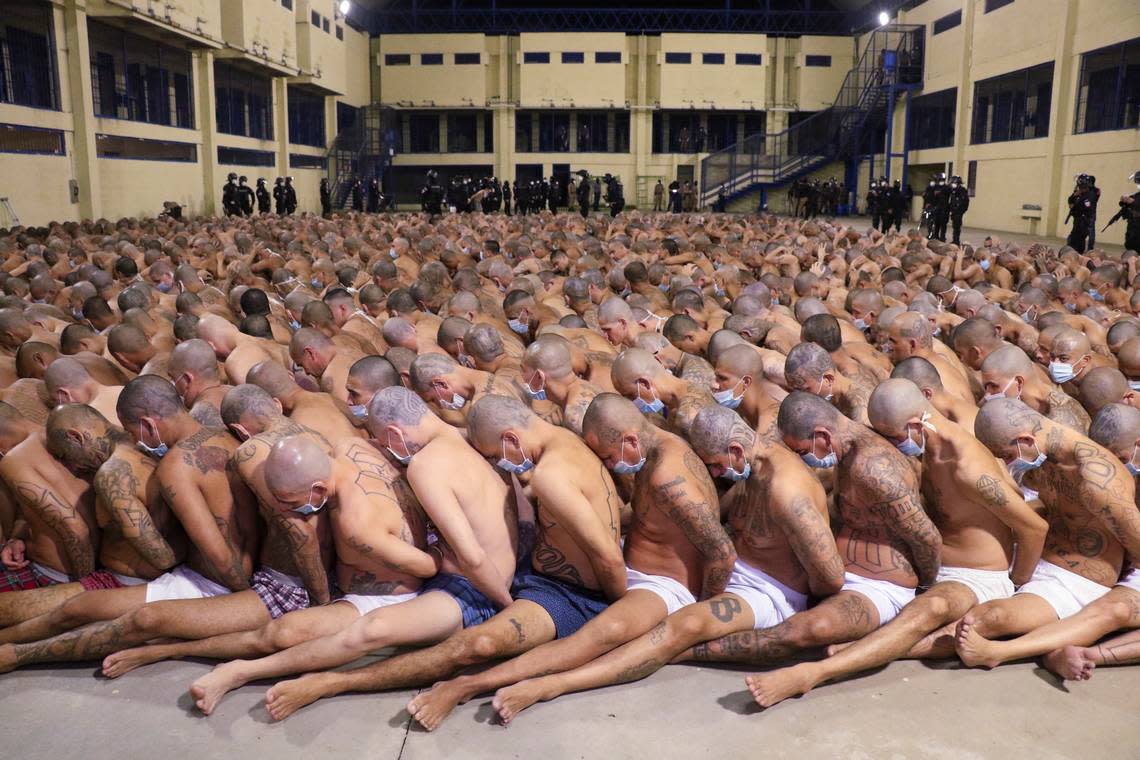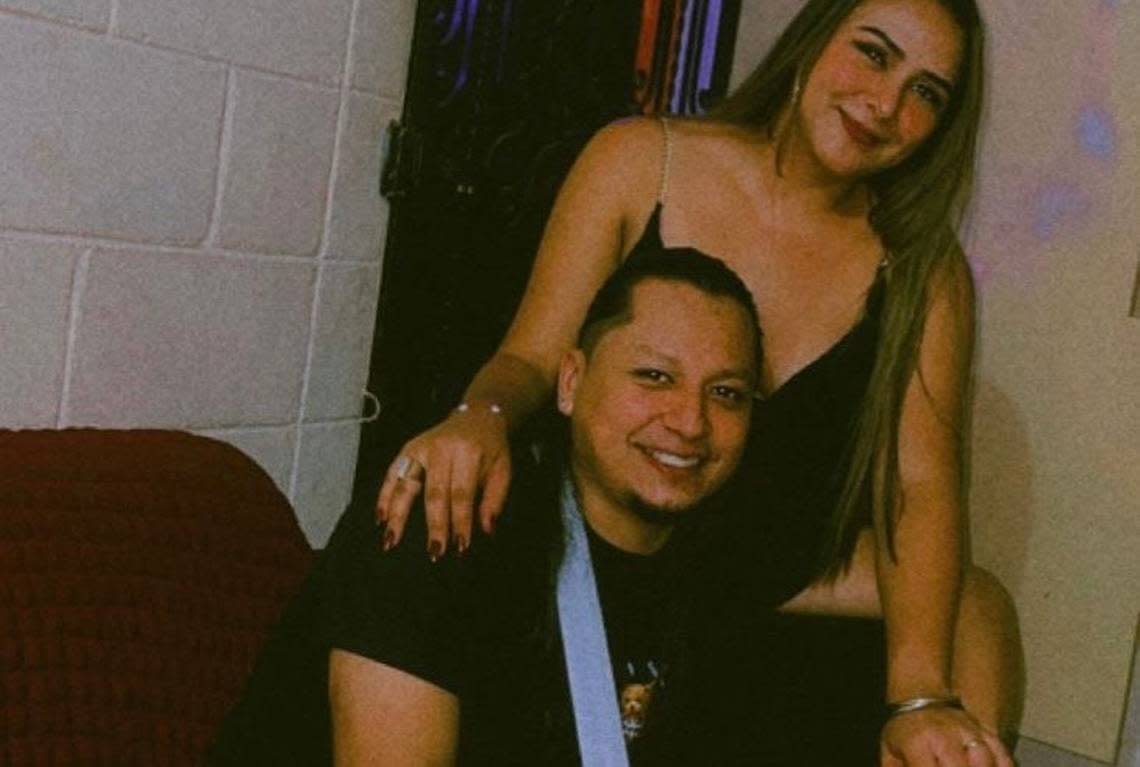Raleigh rapper visited family in El Salvador. His music landed him in prison there.
Sporting a tie-dye T-shirt and round sunglasses, Nelson Hernández raps in a music video against the backdrop of graffiti at the Free Expression Tunnel on N.C. State University’s campus.
The 28-year-old is visibly confident, rapping improvisationally in Spanish over a catchy beat, his lyrical content typical of hip-hop: the supremacy of his rhyming skills over others, smoking weed, his hometown pride.
In the video for the song “Freestyle,” he mentions where he grew up: Nahuizalco in my veins. In my heart, Barrio El Calvario is where I’m from.
Under the moniker “N-Real,” Hernández, who migrated from El Salvador to Raleigh more than a decade ago, makes it a point to stand out as a Latino rapper in the music video from March 2022.
The English sentences sprinkled throughout his freestyle rap show off his bicultural identity.
Late last year, the Cary High School alumnus visited Nahuizalco, about 43 miles west of the Salvadoran capital of San Salvador.
He was there to see his family and girlfriend, Wendy Morán, to whom he’d recently proposed.
On Jan. 10, during the last week of his trip, Salvadoran police detained Hernández while he was walking in a park with Morán.
“The police got out of their vehicle as if they had been searching for him,” his 20-year-old fiancée recalled. “We were on our way to get dinner.”
To the police, Hernández fit the profile of a gang member.
They said they didn’t recognize him and hadn’t seen him regularly in that area. Further investigation by police revealed he recorded what they considered to be suspicious rap music in the United States, according to an arrest report in Spanish reviewed by The News & Observer.
Hernández’s mention of Barrio El Calvario – a formerly gang-controlled neighborhood in El Salvador – in his “Freestyle” video was part of the state’s alleged evidence of his gang ties.
Hernández, though, was a small-time independent rapper with a day job refinishing floors in Raleigh. But now, his home country’s government has accused him of being a hardened criminal and violent gangster.
El Salvador’s controversial crime strategy
Hernández, a U.S. citizen, was jailed under a heavy-handed nationwide crackdown on gangs launched last year by Salvadoran president Nayib Bukele.
The crackdown comes from an indefinite state of emergency declared by Bukele to reduce gang killings. The move cut crime in half last year in a country that has historically dealt with deadly violence from gangs such as Barrio 18 and MS-13.
Millennial president Bukele has received praise from citizens and officials of other countries, including from the U.S., for his response to crime.
But Bukele’s government has been controversial, primarily for the authoritarian nature of his militarized offensive against crime. Groups accuse the regime of violating human rights and arbitrarily jailing thousands of people, often targeting people in poor neighborhoods.
Widespread allegations of human rights violations have plagued Bukele’s “iron fist” or mano dura strategy against crime. A Human Rights Watch report from December details “arbitrary arrests, enforced disappearances, torture and other ill-treatment of detainees, and significant due-process violations.”
El Salvador’s ‘state of exception’
The story of Hernández’s arrest was first reported by bilingual Salvadoran investigative news outlet El Faro.
El Faro’s journalists have reported extensively on the increasingly anti-democratic rule in the country and its no-exceptions gang crackdown. El Faro has also documented the arbitrary arrests of 15 other rappers in the country, detained on the same grounds as Hernández.
El Salvador’s extended emergency response, part of its Territorial Control Plan, has created a nationwide “state of exception” under which the Salvadoran government has included counterterrorism legislation that violates basic rights and allows judges to jail children ages 12 and above, according to Human Rights Watch.
In response, the State Department issued a Level 3 travel advisory for U.S. citizens visiting El Salvador, warning them that authorities have the “power to arrest anyone suspected of gang activity and suspend several constitutional rights.”

El Salvador’s new ‘state of exception’ has resulted in over 2% of the country’s adult population being jailed (some 65,000 people), many losing their rights to legal counsel and due process, according to several media reports. Salvadoran-Americans like Hernández and even immigrants from other countries have been increasingly caught up in the mess.
‘I miss you so much’
It’s been roughly eight months since Anita Hernández last saw her brother.
The two migrated to the U.S. in 2013 and have called Wake County home since.
“We have never been in this position before, and just having my brother in there and not knowing anything about him, it’s really frustrating,” Anita Hernández, 26, told The N&O in an interview.
Hernández hasn’t been allowed to speak to any of his family in person or by phone since being imprisoned in January, his sister said.
He’s being held in a prison that houses thousands of people in the municipality of Zacatecoluca, where inmates work in agricultural production, according to El Faro.
In a country where prison conditions are harsh, Hernández’s family lives with the uncertainty of his well-being.
“We don’t know much about him, like if sick, if he’s doing OK,” Anita Hernández said.
With the help of the U.S. Embassy in San Salvador, his family has been able to relay messages to him and receive a few letters from him, she said.
Hernández has only been able to communicate brief sentences to his family by email correspondence through the embassy.
“Hello Naty, I miss you so much,” he wrote in a July message to a niece in English and Spanish. “I hope I can be there soon, so we can play again. Behave in school and do your homework. I love with you all my heart too. Don’t forget to pray before you go to sleep.”
He signed the message with “Tío Nelson.”
‘They just throw people in jail’
President Bukele has a high approval rating, and a recent poll showed 70% of Salvadorans supported his bid for a second term, according to NBC News.
But the Hernández family, along with many others, feels the consequences of the other side of the Salvador government’s rule.
“They just throw people in jail,” said Anita. “He hasn’t been found guilty of what they’re accusing him of. They don’t have any proof of that, obviously.”
The Nahuizalco police say Hernández’s rap music videos on YouTube “incite and promote terrorist violence” for mentioning Barrio El Calvario, where gangs are present, according to a transcription of his arrest report provided to The N&O.
The report also says “there is information” about him recruiting young people to join the 18-Sureños gang, without citing any evidence.
Hernández’s family said he was profiled by the police for his dark complexion, his tattoos and possibly for not being familiar to neighborhood locals.
None of his music on YouTube references gangs. His five tattoos that were outlined in his arrest report include a clown, a marijuana leaf, a rose, a dollar sign and an ex-girlfriend’s name.
Hernández has no criminal record other than a misdemeanor from 2012, Wake County records show.
Salvadoran gang violence
Salvadoran gang violence has long been a reality and the Hernández family has felt it directly – Hernandez’ older sister and uncle were both killed by gang members at different times.
“You know, how could we be part of that if we have been victims of that? It just doesn’t make sense,” Anita said.
Morán, who became engaged to Hernández last fall, remembers walking with him during the evening in the central park of Nahuizalco when a police vehicle approached them and officers sprung out.

“They told him to stop, to put his hands behind his head and they asked him for his documents. He told them he wasn’t from there,” Morán said in Spanish. “They didn’t ask me for anything.”
Officers took him to the police station for questioning and that was the last time she saw him.
“I felt terrible. I couldn’t even speak because of the fright. I was crying,” she said.
Morán said the police’s accusations were unfounded and disclosed that her older brother was killed by a gang when she was younger.
“How would I want to be together with a (gang member)? You tell me,” she said.
The chances of release from prison in El Salvador
The U.S. Embassy in El Salvador confirmed its knowledge of Hernández’s imprisonment.
“We take our role in assisting U.S. citizens abroad seriously and are monitoring the situation,” Vanessa Smith, a spokesperson for the Bureau of Consular Affairs, wrote in an email to The N&O. “When a U.S. citizen is detained overseas, the Department works to provide all appropriate assistance.”
Two Salvadoran government and prison officials acknowledged a request for comment from The N&O, but did not respond to questions.
Additional officials did not respond to calls or messages.
“The state of exception empowers police and the military to charge a person based just on a suspicion,” said Erick Molina, a criminal defense lawyer who is working on Hernández’s case. “A neighbor or anyone can point to someone as being linked to gangs. Sadly, (an arrest) doesn’t require any type of investigation. A simple accusation is enough.”
After Hernández was detained, Molina told The N&O, authorities gave him only two minutes to see Hernández to sign paperwork.
He has petitioned the Supreme Court to review Hernández’s case so a judge can determine his innocence and rule that he was illegally detained.
But it could be months before Hernández appears in court, and the majority of partisan judges who support Bukele’s regime rarely rule in favor of those unjustly arrested, Molina said.
“The crime policies in El Salvador are totally repressive,” he said. “In 1998, I became a public defender. We have never seen anything like this.”
He estimates that at least a third of the tens of thousands imprisoned under the state of exception were unjustly arrested.
“(The government) only shows the public what is convenient to them, and not the rest,” Morán said. “Sincerely, many people don’t dare to challenge them because they will arrest you and lock you up.”
